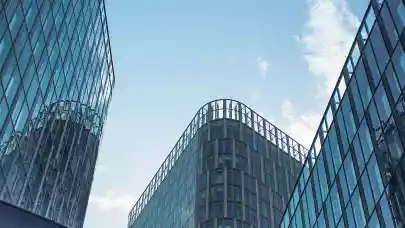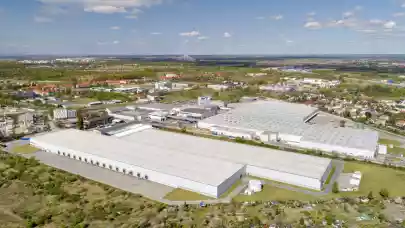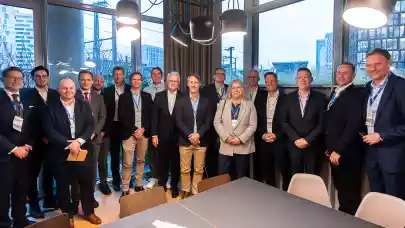
Global economic transformations are impacting how companies operate and how workplaces are designed. The latest report developed by Walter Herz in collaboration with experts from Workplace, ISS Polska, DECISIVE Szmigiel, Papros, Gregorczyk, and Brill AV Media, outlines the leading trends shaping the development of the office market in Poland.
The Office Market
Jarosław Zdzitowiecki, head of Walter Herz’s Tri-City branch, describes the main trends shaping today’s office market. "The widespread adoption of hybrid work is driving the trend of tenants choosing smaller spaces and companies focusing on buildings that offer high quality, located in attractive surroundings in city centres. Comfortable offices equipped with modern technical solutions and offering a friendly environment are gaining in importance", admits Jarosław Zdzitowiecki.
Offices are becoming spaces for meetings, building relationships, team spirit, and company culture, designed to promote team integration.
A characteristic feature of the office market is the low supply of new space. It's increasingly difficult to find a good address that attracts employees, and the number of new developments is limited. Demand for prime space in city centres exceeds supply.
One challenge for market participants is the rising cost of fit-outs and service charges. There’s a growing trend to reduce costs associated with the finishing and fit-out of new offices. Moreover, renegotiations are playing an increasing role in the leasing structure.
Tenants are also looking for ways to control operating costs, while space optimization is leading to a rise in sublease offerings.
Design
Office design and the functional profile of workplaces are also changing significantly. Bogusz Parzyszek, CEO and founder of Workplace, defines the main trends in this area. "The leading trend in office design is related to the need to build company culture and consciously shape the social and organizational aspects of the work environment. The designed space should effectively foster community, integration, and collaboration", says Bogusz Parzyszek.
Experimentation is becoming the foundation of design processes. One direction involves implementing neuroscience guidelines to support mental and physical regeneration through design and amenities.
A change in narrative is guiding designers. Workspaces are being tailored to the needs of people who regularly use the office, moving away from attempts to attract all employees back.
"Technologies based on data analytics and computational models are being used to optimize office spaces and improve their operational efficiency. Smart workplace management, such as using reservation systems to monitor real usage, reduces resource waste", says Bogusz Parzyszek.
Productive innovation is a trend based on the belief that the designed space should help achieve a state of mind referred to as productively innovative.
Fit-out and build
Alicja Muszalska, an architect at ISS – a leading company specializing in creating welcoming workplaces and comprehensive facility management – outlines the key indicators of modern fit-out. Muszalska emphasizes that modern office fit-out is based on durability, moderation, and utility. Durability refers to designing spaces for long-term leases using high-quality, durable materials, including recycled ones, in accordance with ESG principles.
Moderation means cost and environmental efficiency, involving the modification of existing furniture, material recycling, and the use of solutions that reduce resource consumption, including BMS and IoT systems.
Utility emphasizes diversity and inclusivity, supporting DEI policies that foster social connections. Muszalska highlights the importance of managing the paradox of balancing social and environmental interests, such as minimizing waste while providing various types of milk.
"Viewing fit-out as a long-term investment, not just in the space itself but also in cultivating interpersonal relationships, is a uniquely Scandinavian perspective. A well-designed and executed arrangement, based on trends combined with excellence in facility management services and a team that maintains the space in good condition, only enhances the harmony of its long-term use - says Jan Pawlik", Workplace Management Director at ISS.
Technology
Technology is crucial in office planning. Cezary Gromko, AV Integrations Account Manager at Brill AV Media, describes the latest solutions being implemented in offices. In his view, one of the fastest-growing trends in office space design is the integration of podcast studios. "Companies are recognizing the enormous benefits of incorporating solutions beyond traditional AV technology. Podcast studios significantly enhance internal communication within organizations while also serving as an attractive employee benefit. Externally streamed podcasts can also be part of a company’s content marketing strategy", says Cezary Gromko.
Another solution being introduced into offices is interactive monitors, which allow teams to visualize ideas and boost creativity in project work. USB-C technology enables the connection of office laptops, monitors, power, and peripheral accessories through a single cable, creating a "clean desk" environment.
The development of LED technology and device miniaturization has made modern AV solutions more discreet and aesthetically pleasing. Innovative workplaces are also utilizing interactive spaces in leisure zones, where employees can engage in various creative forms of entertainment and education.
Legal Provisions in Lease Agreements
Andrzej Szmigiel, Partner at DECISIVE Szmigiel, Papros, Gregorczyk, discusses new provisions in lease agreements. "A new addition to lease agreements are clauses concerning Service Level Agreements, which ensure the quality of services provided by landlords. Lease agreements are increasingly including clauses that require landlords to hold appropriate certifications for buildings, implement energy-efficient solutions, and use green energy", says Andrzej Szmigiel.
More and more tenants are seeking to introduce clauses allowing them to negotiate individual energy supply contracts and ensure technical capabilities for energy independence. There is also growing attention to precisely defining and accounting for force majeure issues. New contract provisions also address sanctions imposed by the U.S. and the European Union in response to actions by authoritarian regimes, affecting certain entities.



